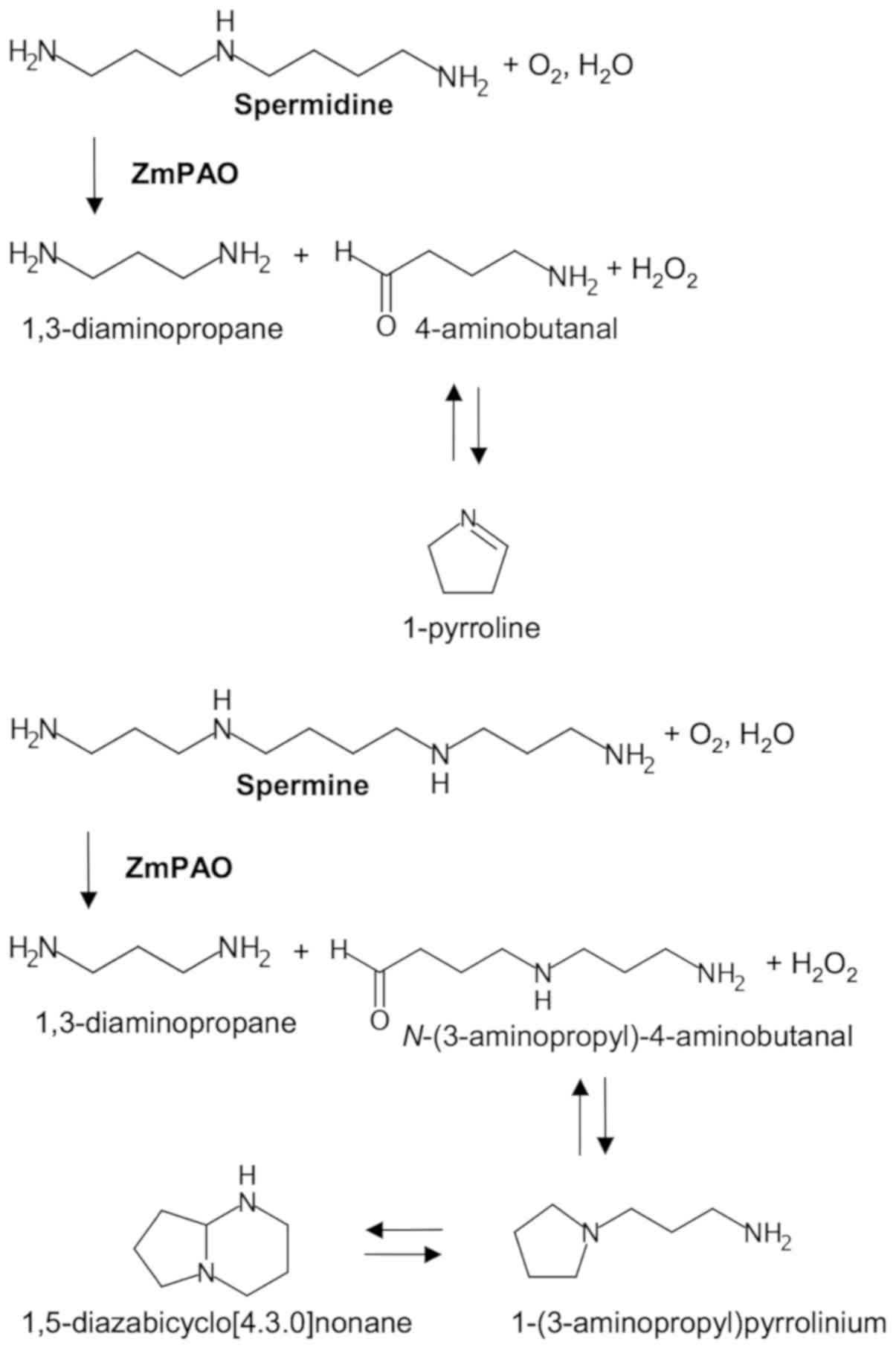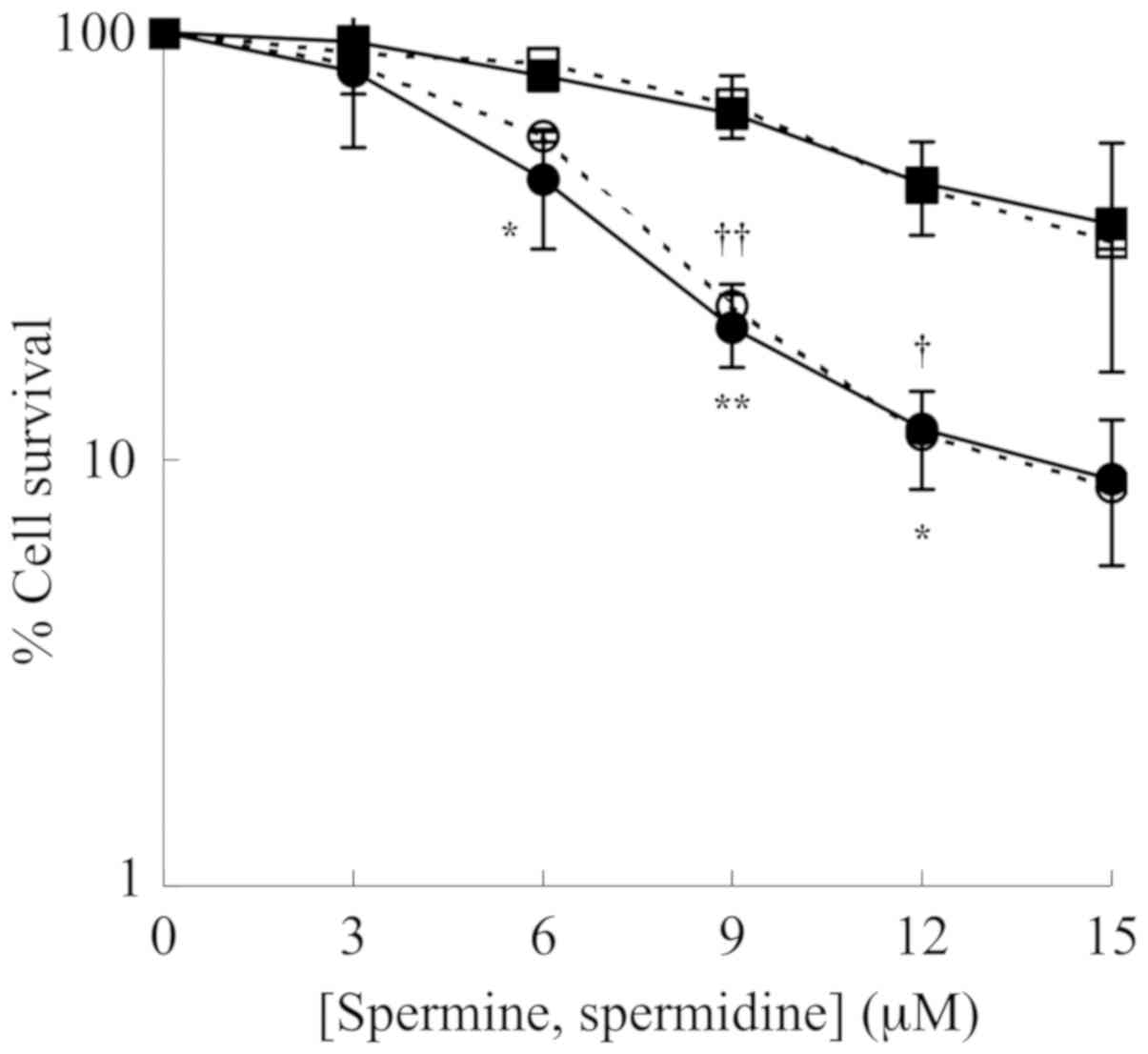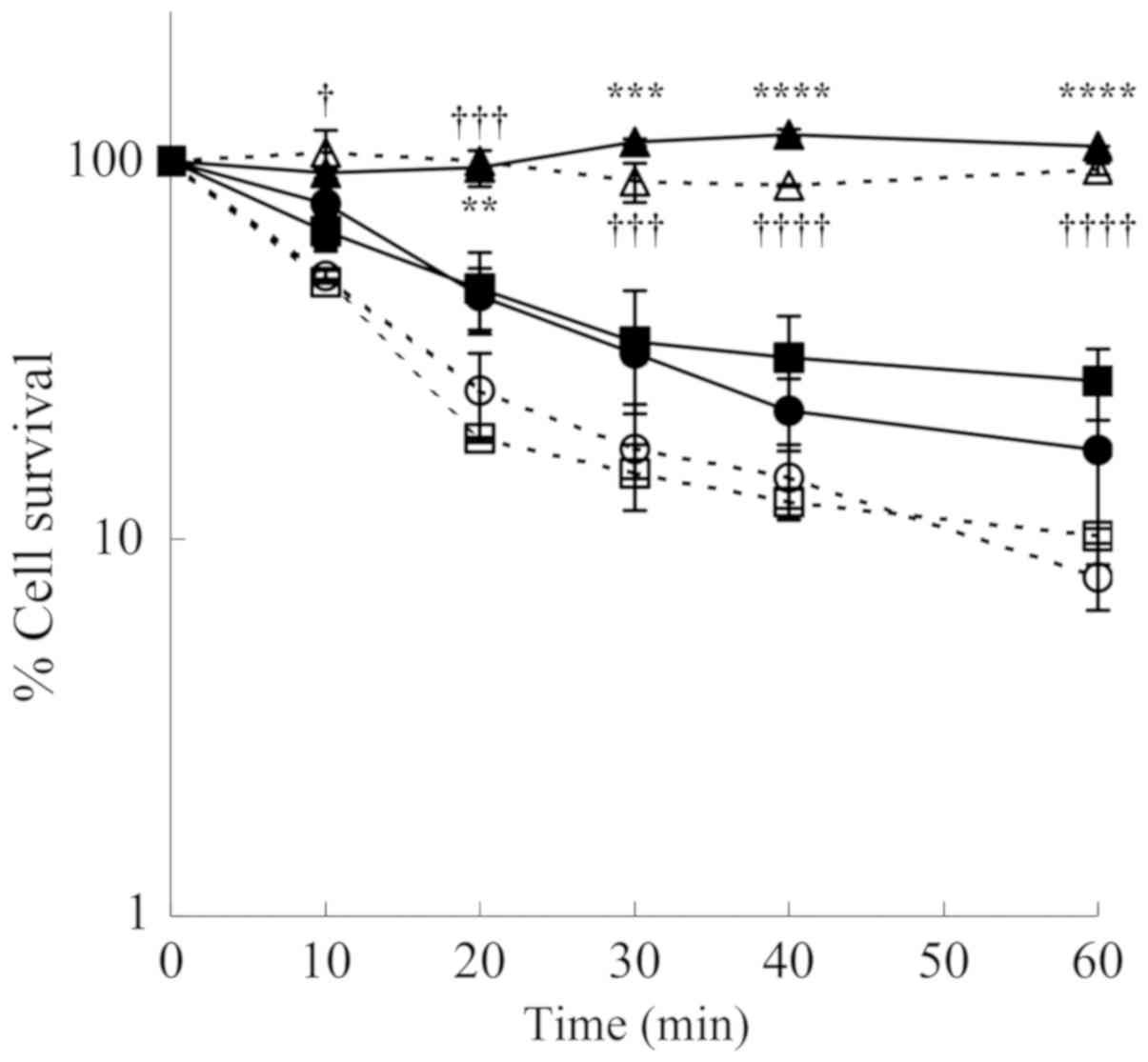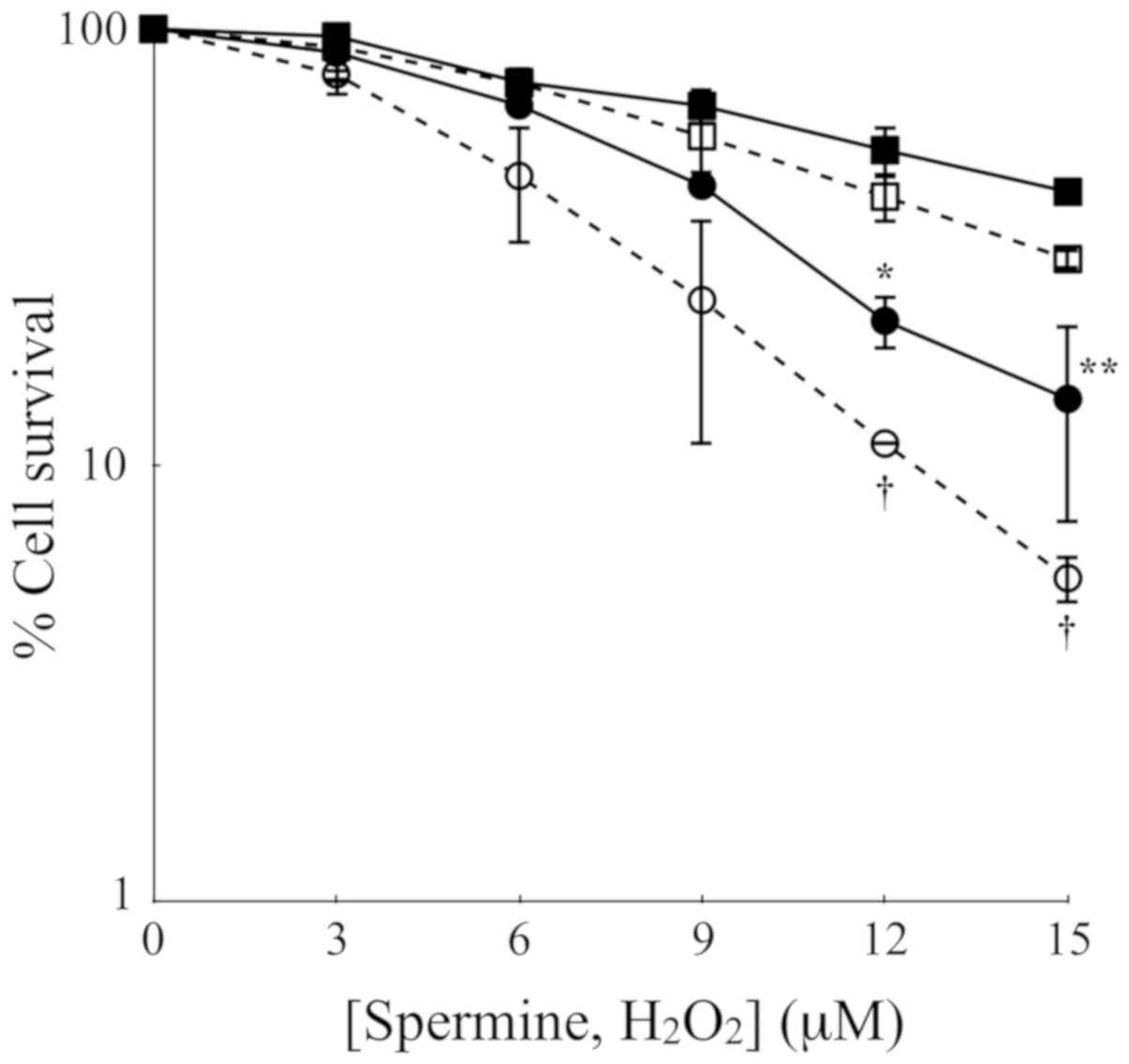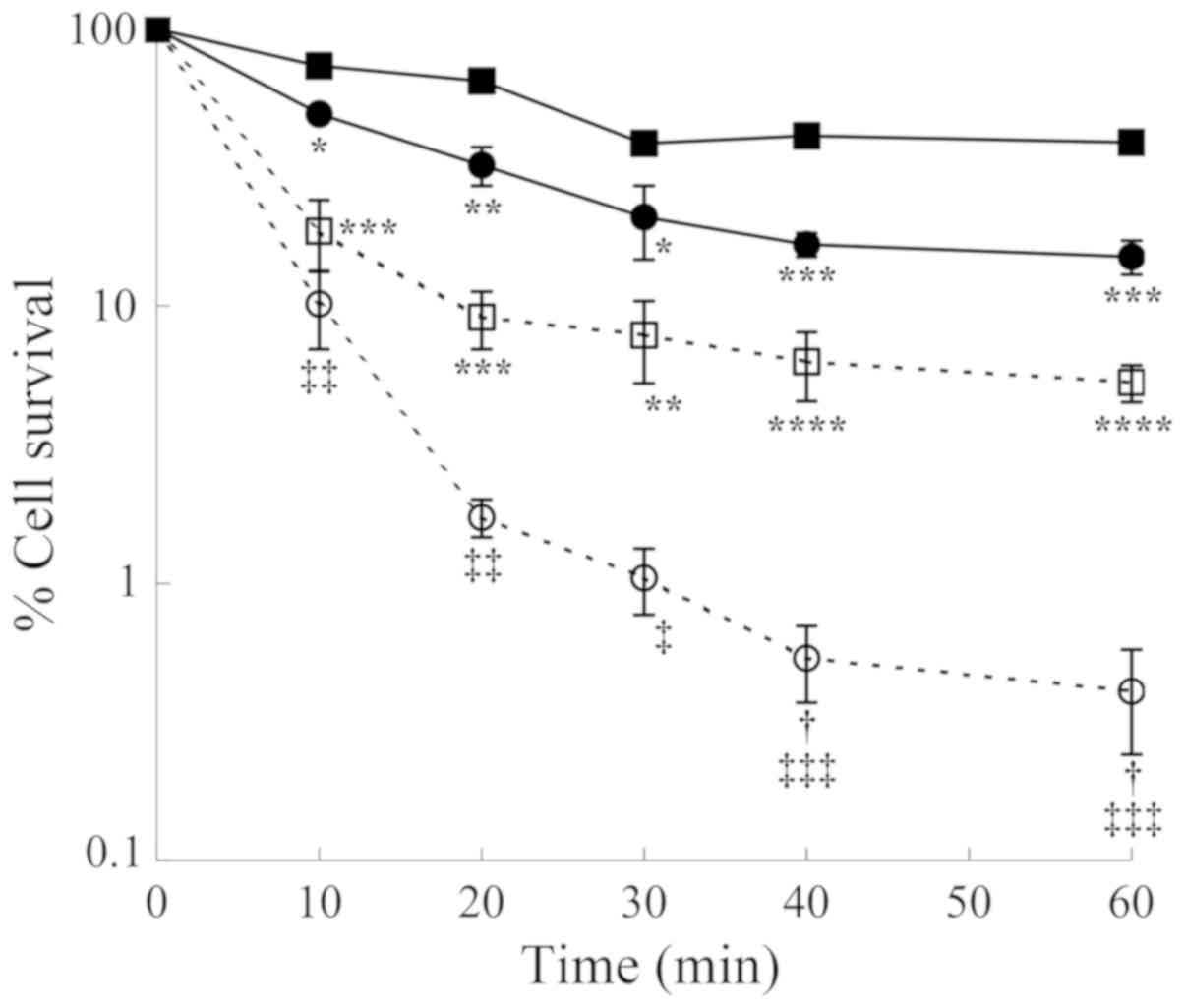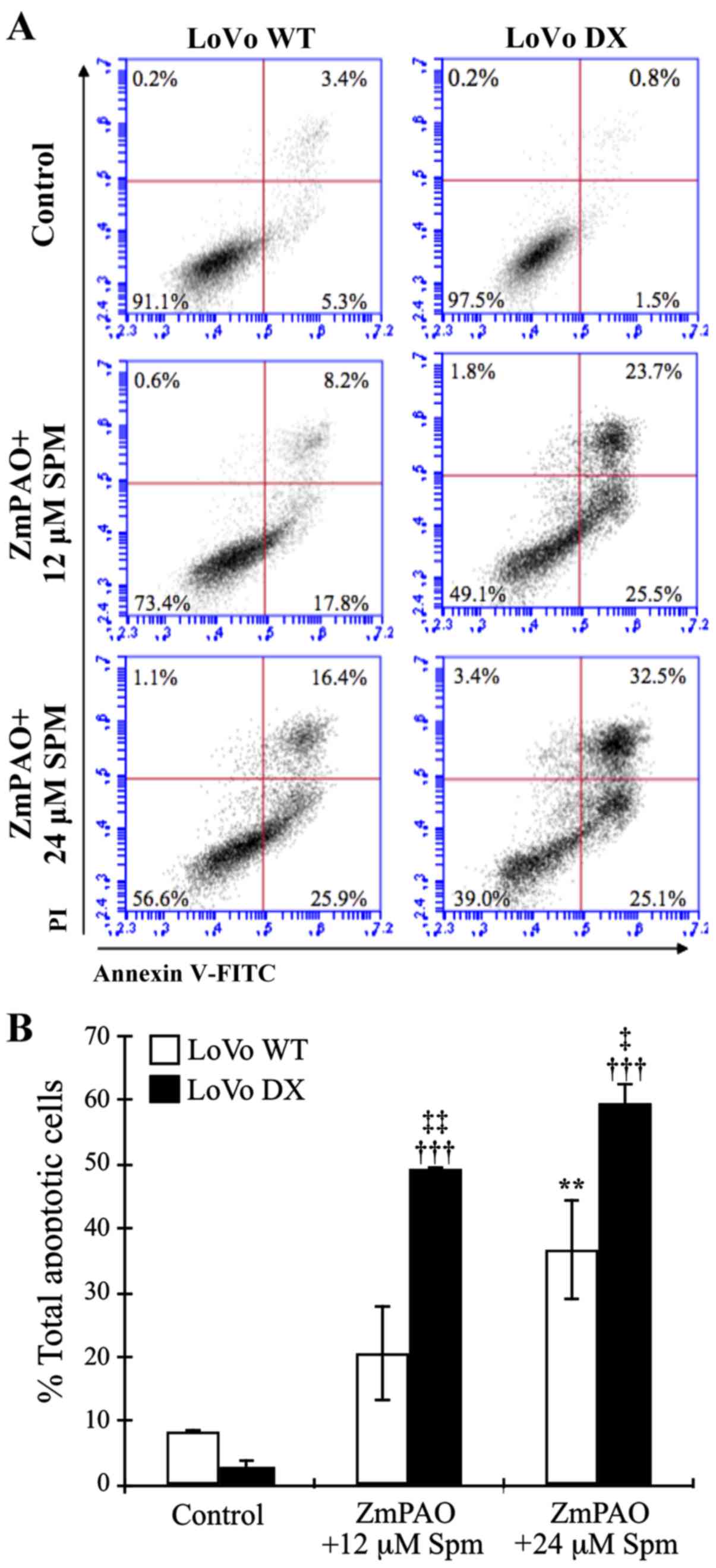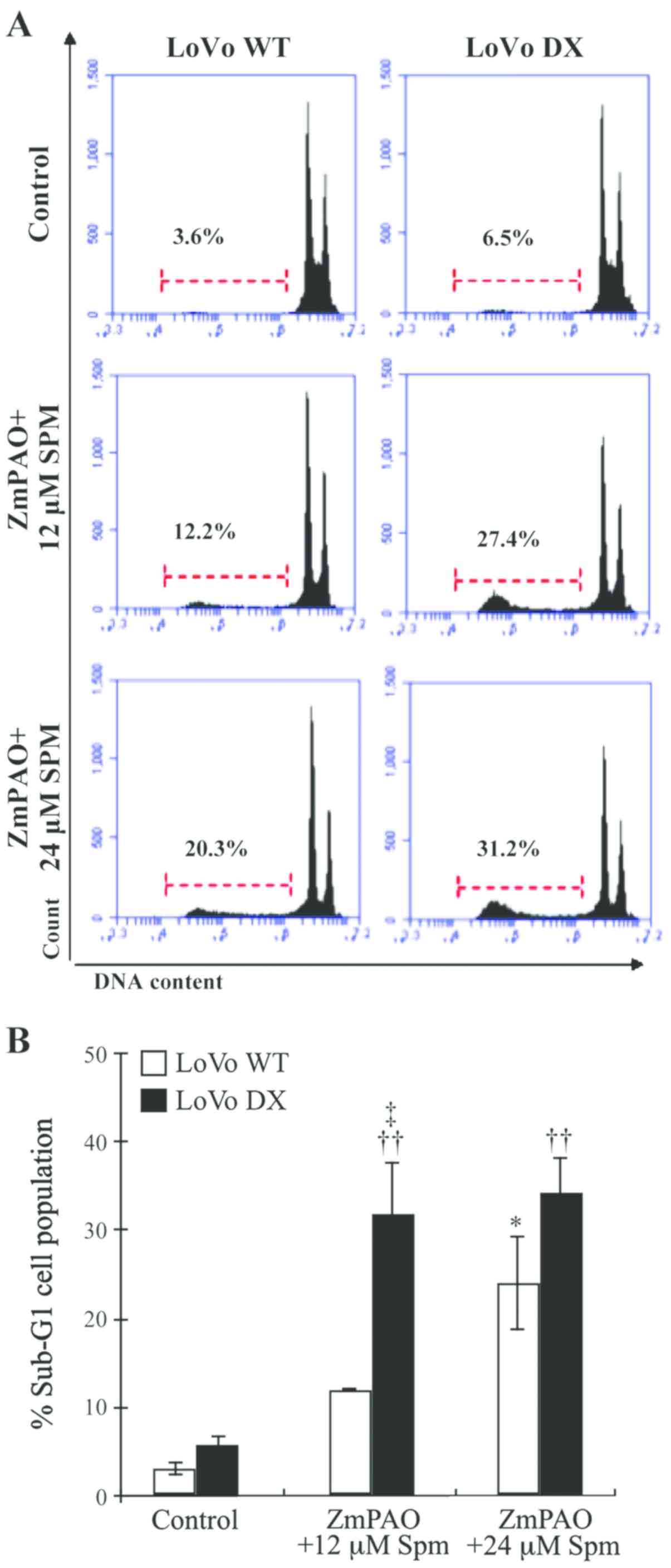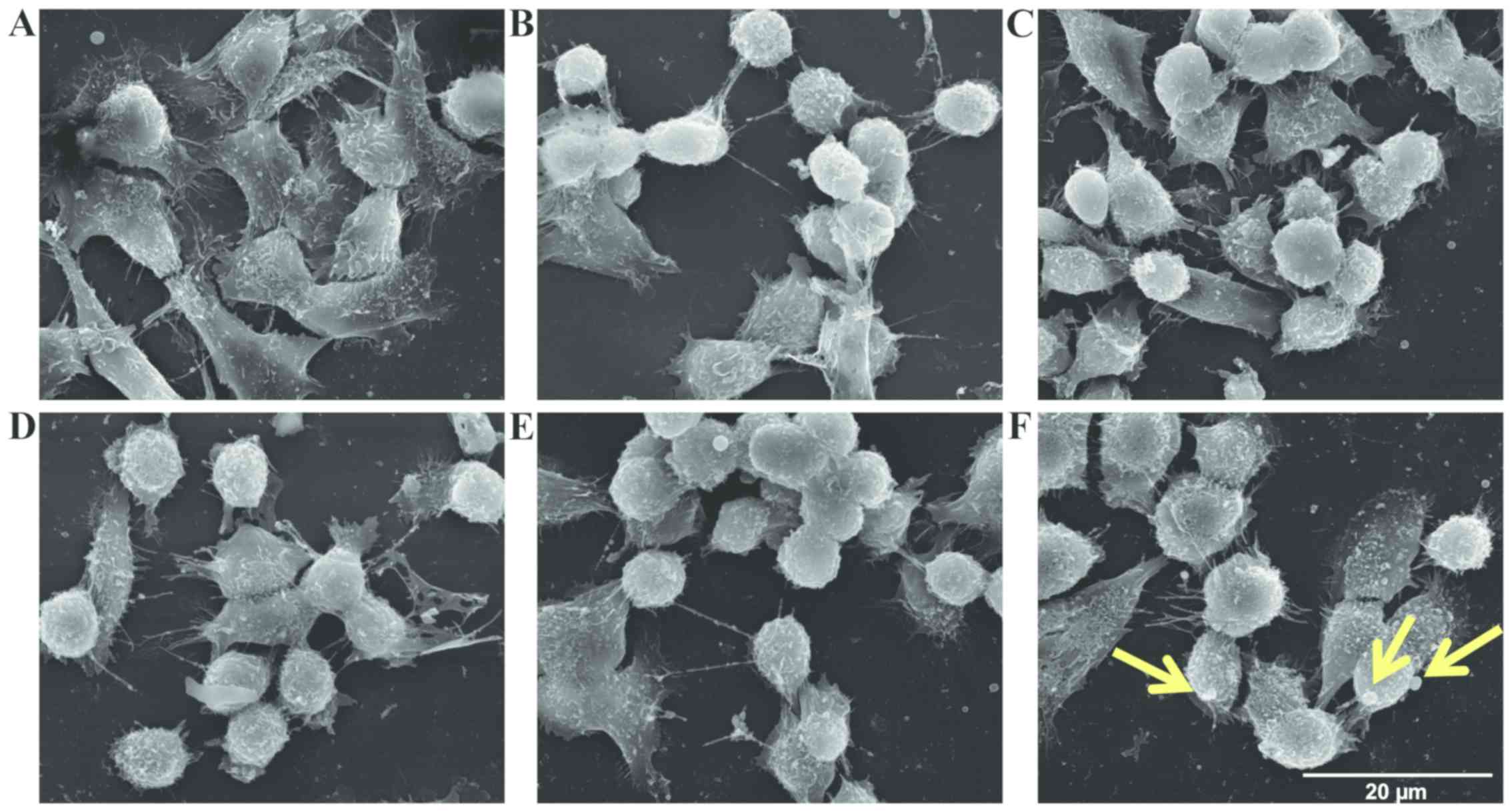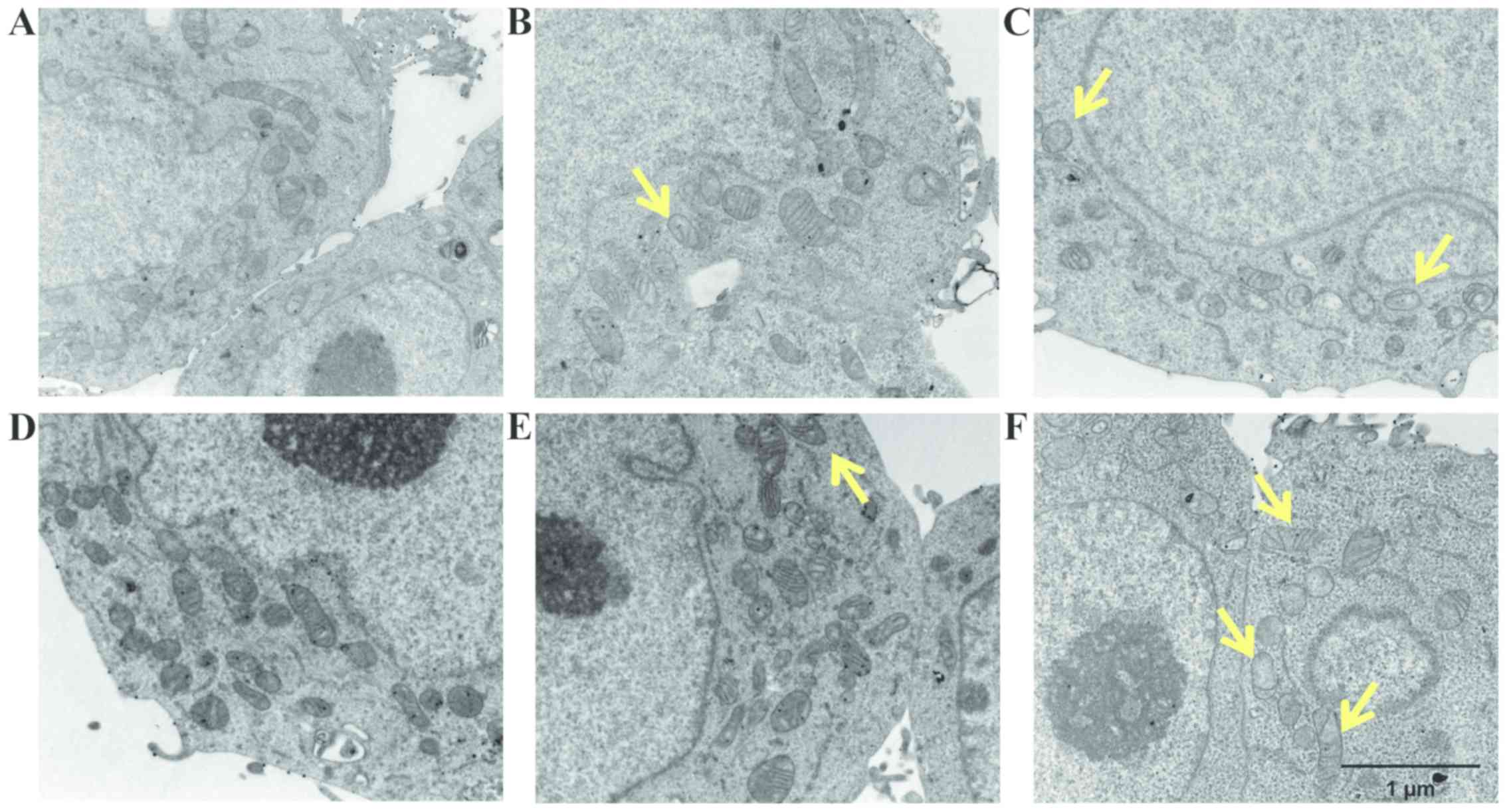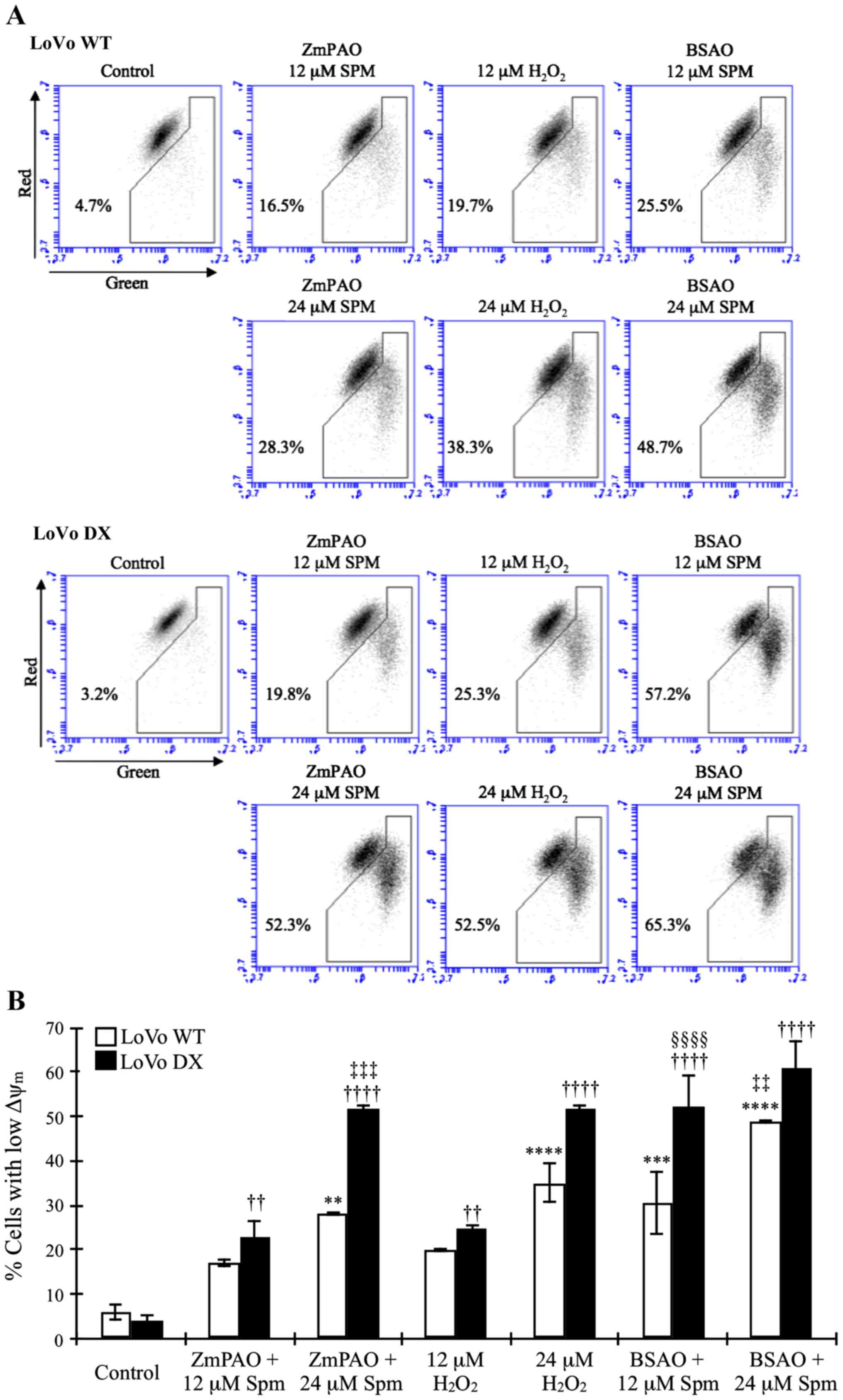|
1
|
Pegg AE: Polyamine metabolism and its
importance in neoplastic growth and a target for chemotherapy.
Cancer Res. 48:759–774. 1988.PubMed/NCBI
|
|
2
|
Bachrach U, Wang YC and Tabib A:
Polyamines: New cues in cellular signal transduction. News Physiol
Sci. 16:106–109. 2001.PubMed/NCBI
|
|
3
|
Mattoo AK, Minocha SC, Minocha R and Handa
AK: Polyamines and cellular metabolism in plants: Transgenic
approaches reveal different responses to diamine putrescine versus
higher poly-amines spermidine and spermine. Amino Acids.
38:405–413. 2010. View Article : Google Scholar
|
|
4
|
Migliaccio N, Martucci NM, Ruggiero I,
Sanges C, Ohkubo S, Lamberti A, Agostinelli E and Arcari P: Ser/Thr
kinases and polyamines in the regulation of non-canonical functions
of elongation factor 1A. Amino Acids. 48:2339–2352. 2016.
View Article : Google Scholar : PubMed/NCBI
|
|
5
|
Schuber F: Influence of polyamines on
membrane functions. Biochem J. 260:1–10. 1989. View Article : Google Scholar : PubMed/NCBI
|
|
6
|
Ficker E, Taglialatela M, Wible BA, Henley
CM and Brown AM: Spermine and spermidine as gating molecules for
inward rectifier K+ channels. Science. 266:1068–1072.
1994. View Article : Google Scholar : PubMed/NCBI
|
|
7
|
Neel BG and Tonks NK: Protein tyrosine
phosphatases in signal transduction. Curr Opin Cell Biol.
9:193–204. 1997. View Article : Google Scholar : PubMed/NCBI
|
|
8
|
Grancara S, Dalla Via L, García-Argáez AN,
Ohkubo S, Pacella E, Manente S, Bragadin M, Toninello A and
Agostinelli E: Spermine cycling in mitochondria is mediated by
adenine nucleotide translocase activity: Mechanism and
pathophysiological implications. Amino Acids. 48:2327–2337. 2016.
View Article : Google Scholar : PubMed/NCBI
|
|
9
|
Madeo F, Eisenberg T, Pietrocola F and
Kroemer G: Spermidine in health and disease. Science.
359:eaan27882018. View Article : Google Scholar : PubMed/NCBI
|
|
10
|
Lee CY, Su GC, Huang WY, Ko MY, Yeh HY,
Chang GD, Lin SJ and Chi P: Promotion of homology-directed DNA
repair by polyamines. Nat Commun. 10:652019. View Article : Google Scholar : PubMed/NCBI
|
|
11
|
Cervelli M, Angelucci E, Germani F,
Amendola R and Mariottini P: Inflammation, carcinogenesis and
neurodegeneration studies in transgenic animal models for polyamine
research. Amino Acids. 46:521–530. 2014. View Article : Google Scholar
|
|
12
|
Park MH and Igarashi K: Polyamines and
their metabolites as diagnostic markers of human diseases. Biomol
Ther (Seoul). 21:1–9. 2013. View Article : Google Scholar
|
|
13
|
Wallace HM and Fraser AV: Inhibitors of
polyamine metabolism: Review article. Amino Acids. 26:353–365.
2004. View Article : Google Scholar : PubMed/NCBI
|
|
14
|
McCann PP and Pegg AE: Ornithine
decarboxylase as an enzyme target for therapy. Pharmacol Ther.
54:195–215. 1992. View Article : Google Scholar : PubMed/NCBI
|
|
15
|
Nakanishi S and Cleveland JL: Targeting
the polyamine-hypusine circuit for the prevention and treatment of
cancer. Amino Acids. 48:2353–2362. 2016. View Article : Google Scholar : PubMed/NCBI
|
|
16
|
Tabib A and Bachrach U: Role of polyamines
in mediating malignant transformation and oncogene expression. Int
J Biochem Cell Biol. 31:1289–1295. 1999. View Article : Google Scholar : PubMed/NCBI
|
|
17
|
Patel AR and Wang JY: Polyamines modulate
transcription but not posttranscription of c-myc and c-jun in IEC-6
cells. Am J Physiol. 273:C1020–C1029. 1997. View Article : Google Scholar : PubMed/NCBI
|
|
18
|
Xiao L and Wang JY: Posttranscriptional
regulation of gene expression in epithelial cells by polyamines.
Methods Mol Biol. 720:67–79. 2011. View Article : Google Scholar : PubMed/NCBI
|
|
19
|
Šebela M, Radová A, Angelini R,
Tavladoraki P, Frébort I and Peč P: FAD-containing polyamine
oxidases: A timely challenge for researchers in biochemistry and
physiology of plants. Plant Sci. 160:197–207. 2001. View Article : Google Scholar : PubMed/NCBI
|
|
20
|
Suzuki Y and Yanagisawa H: Purification
and properties of maize polyamine oxidase: A flavoprotein. Plant
Cell Physiol. 21:1085–1094. 1980.
|
|
21
|
Cona A, Moreno S, Cenci F, Federico R and
Angelini R: Cellular re-distribution of flavin-containing polyamine
oxidase in differentiating root and mesocotyl of Zea mays L.
seedlings. Planta. 221:265–276. 2005. View Article : Google Scholar
|
|
22
|
Cona A, Cenci F, Cervelli M, Federico R,
Mariottini P, Moreno S and Angelini R: Polyamine oxidase, a
hydrogen peroxide-producing enzyme, is up-regulated by light and
down-regulated by auxin in the outer tissues of the maize
mesocotyl. Plant Physiol. 131:803–813. 2003. View Article : Google Scholar : PubMed/NCBI
|
|
23
|
Pennell RI and Lamb C: Programmed cell
death in plants. Plant Cell. 9:1157–1168. 1997. View Article : Google Scholar : PubMed/NCBI
|
|
24
|
Kärkönen A and Kuchitsu K: Reactive oxygen
species in cell wall metabolism and development in plants.
Phytochemistry. 112:22–32. 2015. View Article : Google Scholar
|
|
25
|
Houen G, Struve C, Søndergaard R, Friis T,
Anthoni U, Nielsen PH, Christophersen C, Petersen BO and Duus JØ:
Substrate specificity of the bovine serum amine oxidase and in situ
characterisation of aminoaldehydes by NMR spectroscopy. Bioorg Med
Chem. 13:3783–3796. 2005. View Article : Google Scholar : PubMed/NCBI
|
|
26
|
De Matteis G, Agostinelli E, Mondovì B and
Morpurgo L: The metal function in the reactions of bovine serum
amine oxidase with substrates and hydrazine inhibitors. J Biol
Inorg Chem. 4:348–353. 1999. View Article : Google Scholar : PubMed/NCBI
|
|
27
|
Agostinelli E and Seiler N:
Non-irradiation-derived reactive oxygen species (ROS) and cancer:
Therapeutic implications. Amino Acids. 31:341–355. 2006. View Article : Google Scholar : PubMed/NCBI
|
|
28
|
Sharmin S, Sakata K, Kashiwagi K, Ueda S,
Iwasaki S, Shirahata A and Igarashi K: Polyamine cytotoxicity in
the presence of bovine serum amine oxidase. Biochem Biophys Res
Commun. 282:228–235. 2001. View Article : Google Scholar : PubMed/NCBI
|
|
29
|
Binda C, Coda A, Angelini R, Federico R,
Ascenzi P and Mattevi A: A 30-angstrom-long U-shaped catalytic
tunnel in the crystal structure of polyamine oxidase. Structure.
7:265–276. 1999. View Article : Google Scholar : PubMed/NCBI
|
|
30
|
Tavladoraki P, Cona A and Angelini R:
Copper-containing amine oxidases and FAD-dependent polyamine
oxidases are key players in plant tissue differentiation and organ
development. Front Plant Sci. 7:824–834. 2016.Review. View Article : Google Scholar : PubMed/NCBI
|
|
31
|
Cona A, Federico R, Gramiccia M, Orsini S
and Gradoni L: The amino aldehydes produced by spermine and
spermidine oxidation with maize polyamine oxidase have
anti-leishmanial effect. Biotechnol Appl Biochem. 14:54–59.
1991.PubMed/NCBI
|
|
32
|
Cona A, Rea G, Angelini R, Federico R and
Tavladoraki P: Functions of amine oxidases in plant development and
defence. Trends Plant Sci. 11:80–88. 2006. View Article : Google Scholar : PubMed/NCBI
|
|
33
|
Bouchereau A, Aziz A, Larher F and
Martin-Tanguy J: Polyamines and environmental challenges: Recent
development. Plant Sci. 140:103–125. 1999. View Article : Google Scholar
|
|
34
|
Massa S, Spanò D, Pintus F, Medda R and
Floris G: Oxidation of di- and polyamines: In vitro effect of amino
aldehydes on the vitality of Leishmania promastigotes. Med Chem
Res. 19:77–83. 2010. View Article : Google Scholar
|
|
35
|
Wu Q, Yang Z, Nie Y, Shi Y and Fan D:
Multi-drug resistance in cancer chemotherapeutics: Mechanisms and
lab approaches. Cancer Lett. 347:159–166. 2014. View Article : Google Scholar : PubMed/NCBI
|
|
36
|
Cole SP: Targeting multidrug resistance
protein 1 (MRP1, ABCC1): Past, present, and future. Annu Rev
Pharmacol Toxicol. 54:95–117. 2014. View Article : Google Scholar
|
|
37
|
Meschini S, Calcabrini A, Monti E, Del
Bufalo D, Stringaro A, Dolfini E and Arancia G: Intracellular
P-glycoprotein expression is associated with the intrinsic
multidrug resistance phenotype in human colon adenocarcinoma cells.
Int J Cancer. 87:615–628. 2000. View Article : Google Scholar : PubMed/NCBI
|
|
38
|
Arancia G, Calcabrini A, Marra M, Crateri
P, Artico M, Martone A, Martelli F and Agostinelli E: Mitochondrial
alterations induced by serum amine oxidase and spermine on human
multidrug resistant tumor cells. Amino Acids. 26:273–282. 2004.
View Article : Google Scholar : PubMed/NCBI
|
|
39
|
Calcabrini A, Arancia G, Marra M, Crateri
P, Befani O, Martone A and Agostinelli E: Enzymatic oxidation
products of spermine induce greater cytotoxic effects on human
multidrug-resistant colon carcinoma cells (LoVo) than on their
wild-type counterparts. Int J Cancer. 99:43–52. 2002. View Article : Google Scholar : PubMed/NCBI
|
|
40
|
Agostinelli E, Belli F, Molinari A,
Condello M, Palmigiani P, Vedova LD, Marra M, Seiler N and Arancia
G: Toxicity of enzymatic oxidation products of spermine to human
melanoma cells (M14): Sensitization by heat and MDL 72527. Biochim
Biophys Acta. 1763:1040–1050. 2006. View Article : Google Scholar : PubMed/NCBI
|
|
41
|
Agostinelli E, Condello M, Molinari A,
Tempera G, Viceconte N and Arancia G: Cytotoxicity of spermine
oxidation products to multidrug resistant melanoma M14 ADR2 cells:
Sensitization by the MDL 72527 lysosomotropic compound. Int J
Oncol. 35:485–498. 2009. View Article : Google Scholar : PubMed/NCBI
|
|
42
|
Agostinelli E, Condello M, Tempera G,
Macone A, Bozzuto G, Ohkubo S, Calcabrini A, Arancia G and Molinari
A: The combined treatment with chloroquine and the enzymatic
oxidation products of spermine overcomes multidrug resistance of
melanoma M14 ADR2 cells: A new therapeutic approach. Int J Oncol.
45:1109–1122. 2014. View Article : Google Scholar : PubMed/NCBI
|
|
43
|
Averill-Bates DA, Chérif A, Agostinelli E,
Tanel A and Fortier G: Anti-tumoral effect of native and
immobilized bovine serum amine oxidase in a mouse melanoma model.
Biochem Pharmacol. 69:1693–1704. 2005. View Article : Google Scholar : PubMed/NCBI
|
|
44
|
Averill-Bates DA, Ke Q, Tanel A, Roy J,
Fortier G and Agostinelli E: Mechanism of cell death induced by
spermine and amine oxidase in mouse melanoma cells. Int J Oncol.
32:79–88. 2008.
|
|
45
|
Polticelli F, Basran J, Faso C, Cona A,
Minervini G, Angelini R, Federico R, Scrutton NS and Tavladoraki P:
Lys300 plays a major role in the catalytic mechanism of maize
polyamine oxidase. Biochemistry. 44:16108–16120. 2005. View Article : Google Scholar : PubMed/NCBI
|
|
46
|
Averill-Bates DA, Agostinelli E,
Przybytkowski E, Mateescu MA and Mondovì B: Cytotoxicity and
kinetic analysis of purified bovine serum amine oxidase in the
presence of spermine in Chinese hamster ovary cells. Arch Biochem
Biophys. 300:75–79. 1993. View Article : Google Scholar : PubMed/NCBI
|
|
47
|
Agostinelli E, De Matteis G, Mondovì B and
Morpurgo L: Reconstitution of Cu2+-depleted bovine serum
amine oxidase with Co2+. Biochem J. 330:383–387. 1998.
View Article : Google Scholar
|
|
48
|
Cervelli M, Cona A, Angelini R, Polticelli
F, Federico R and Mariottini P: A barley polyamine oxidase isoform
with distinct structural features and subcellular localization. Eur
J Biochem. 268:3816–3830. 2001. View Article : Google Scholar : PubMed/NCBI
|
|
49
|
Federico R, Alisi C and Forlani F:
Properties of the polyamine oxidase from the cell wall of maize
seedlings. Phytochemistry. 28:45–46. 1989. View Article : Google Scholar
|
|
50
|
Turini P, Sabatini S, Befani O, Chimenti
F, Casanova C, Riccio PL and Mondovì B: Purification of bovine
plasma amine oxidase. Anal Biochem. 125:294–298. 1982. View Article : Google Scholar : PubMed/NCBI
|
|
51
|
Janes SM, Mu D, Wemmer D, Smith AJ, Kaur
S, Maltby D, Burlingame AL and Klinman JP: A new redox cofactor in
eukaryotic enzymes: 6-hydroxydopa at the active site of bovine
serum amine oxidase. Science. 248:981–987. 1990. View Article : Google Scholar : PubMed/NCBI
|
|
52
|
Angelini R, Cona A and Tavladoraki P:
Determination of copper amine oxidase activity in plant tissues.
Methods Mol Biol. 1694:129–139. 2018. View Article : Google Scholar
|
|
53
|
Dolfini E, Dasdia T, Arancia G, Molinari
A, Calcabrini A, Scheper RJ, Flens MJ, Gariboldi MB and Monti E:
Characterization of a clonal human colon adenocarcinoma line
intrinsically resistant to doxorubicin. Br J Cancer. 76:67–76.
1997. View Article : Google Scholar : PubMed/NCBI
|
|
54
|
Grandi M, Geroni C and Giuliani FC:
Isolation and characterization of a human colon adenocarcinoma cell
line resistant to doxorubicin. Br J Cancer. 54:515–518. 1986.
View Article : Google Scholar : PubMed/NCBI
|
|
55
|
van Engeland M, Nieland LJ, Ramaekers FC,
Schutte B and Reutelingsperger CP: Annexin V-affinity assay: A
review on an apoptosis detection system based on phosphatidylserine
exposure. Cytometry. 31:1–9. 1998. View Article : Google Scholar : PubMed/NCBI
|
|
56
|
Nicoletti I, Migliorati G, Pagliacci MC,
Grignani F and Riccardi C: A rapid and simple method for measuring
thymocyte apoptosis by propidium iodide staining and flow
cytometry. J Immunol Methods. 139:271–279. 1991. View Article : Google Scholar : PubMed/NCBI
|
|
57
|
Federico R, Cona A, Angelini R, Schininà
ME and Giartosio A: Characterization of maize polyamine oxidase.
Phytochemistry. 29:2411–2414. 1990. View Article : Google Scholar : PubMed/NCBI
|
|
58
|
Damaghi M, Wojtkowiak JW and Gillies RJ:
pH sensing and regulation in cancer. Front Physiol. 4:370–379.
2013. View Article : Google Scholar
|
|
59
|
De Biase D, Agostinelli E, De Matteis G,
Mondovì B and Morpurgo L: Half-of-the-sites reactivity of bovine
serum amine oxidase. Reactivity and chemical identity of the second
site. Eur J Biochem. 237:93–99. 1996. View Article : Google Scholar : PubMed/NCBI
|
|
60
|
Agostinelli E, Arancia G, Vedova LD, Belli
F, Marra M, Salvi M and Toninello A: The biological functions of
polyamine oxidation products by amine oxidases: Perspectives of
clinical applications. Amino Acids. 27:347–358. 2004. View Article : Google Scholar : PubMed/NCBI
|
|
61
|
Agostinelli E, Belli F, Dalla Vedova L,
Marra M, Crateri P and Arancia G: Hyperthermia enhances
cytotoxicity of amine oxidase and spermine on drug-resistant LoVo
colon adenocar-cinoma cells. Int J Oncol. 28:1543–1553.
2006.PubMed/NCBI
|
|
62
|
Agostinelli E, Vedova LD, Belli F,
Condello M, Arancia G and Seiler N: Sensitization of human colon
adenocarcinoma cells (LoVo) to reactive oxygen species by a
lysosomotropic compound. Int J Oncol. 29:947–955. 2006.PubMed/NCBI
|
|
63
|
Iyamu E, Perdew H and Woods G: Growth
inhibitory and differentiation effects of chloroquine and its
analogue on human leukemic cells potentiate fetal hemoglobin
production by targeting the polyamine pathway. Biochem Pharmacol.
77:1021–1028. 2009. View Article : Google Scholar
|
|
64
|
Marcocci L, Casadei M, Faso C, Antoccia A,
Stano P, Leone S, Mondovì B, Federico R and Tavladoraki P:
Inducible expression of maize polyamine oxidase in the nucleus of
MCF-7 human breast cancer cells confers sensitivity to etoposide.
Amino Acids. 34:403–412. 2008. View Article : Google Scholar
|
|
65
|
Grancara S, Zonta F, Ohkubo S, Brunati AM,
Agostinelli E and Toninello A: Pathophysiological implications of
mitochondrial oxidative stress mediated by mitochondriotropic
agents and poly-amines: The role of tyrosine phosphorylation. Amino
Acids. 47:869–883. 2015. View Article : Google Scholar : PubMed/NCBI
|
|
66
|
Amendola R, Cervelli M, Fratini E,
Sallustio DE, Tempera G, Ueshima T, Mariottini P and Agostinelli E:
Reactive oxygen species spermine metabolites generated from amine
oxidases and radiation represent a therapeutic gain in cancer
treatments. Int J Oncol. 43:813–820. 2013. View Article : Google Scholar : PubMed/NCBI
|















